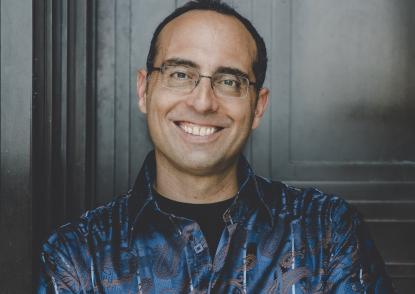
Dr. Philip Metres, recipient of the Guggenheim Fellowship.

Dr. Philip Metres, recipient of the Guggenheim Fellowship.
Dr. Philip Metres, a professor in the Department of English and director of the Peace, Justice, and Human Rights Program, was awarded a Guggenheim Fellowship for his contributions to poetry.
Metres is an author of 10 books including the forthcoming Shrapnel Maps. The prestigious honor adds to a long list of recognitions for Metres, including a Lannan fellowship, two NEA fellowships, six Ohio Arts Council Grants, the Hunt Prize, the Adrienne Rich Award, three Arab American Book Awards, the Watson Fellowship, the Lyric Poetry Prize, and the Cleveland Arts Prize.
“I’ve applied for the Guggenheim Fellowship for the past decade, so winning it this year comes as a surreal wonder and a profound relief,” commented Metres. “I’m grateful to the Foundation for their validation of my work, particularly my new book Shrapnel Maps, and their support of poets and poetry more broadly--a genre that is not always given a lot of love. Poetry has changed my life. It has made me who I am, and it has altered the fates of so many people. There’s something so intimate and secretly powerful about the work of poetry in people’s lives. I frequently hear people say that a poem has saved their life. They mean that they found a reason to keep living because of the secrets a poem has laid bare. That’s reason enough to keep writing and keep reading.”
The Board of Trustees of the John Simon Guggenheim Memorial Foundation approved the awarding of the 2020 Guggenheim Fellowships to a diverse group of 175 writers, scholars, artists, and scientists in April. Appointed on the basis of prior achievement and exceptional promise, the successful candidates were chosen through a rigorous peer-review process from almost 3,000 applicants in the Foundation’s ninety-fifth competition.
“It’s exceptionally encouraging to be able to share such positive news at this terribly challenging time” said Edward Hirsch, President of the Foundation. “A Guggenheim Fellowship has always offered practical assistance, helping Fellows do their work, but for many of the new Fellows, it may be a lifeline at a time of hardship, a survival tool as well as a creative one. As we grapple with the difficulties of the moment, it is also important to look to the future. The artists, writers, scholars, and scientific researchers supported by the Fellowship will help us understand and learn from what we are enduring individually and collectively, and it is an honor for the Foundation to help them do their essential work.”
The great variety of backgrounds, fields of study, and accomplishments of Guggenheim Fellows is a unique characteristic of the Fellowship program. In all, 53 scholarly disciplines and artistic fields, 75 different academic institutions, 31 states and the District of Columbia, and 2 Canadian provinces are represented in this year’s class of Fellows, who range in age from 29 to 82. Close to 60 Fellows have no full-time college or university affiliation.
Since its establishment in 1925, the John Simon Guggenheim Memorial Foundation has granted more than $375 million in Fellowships to over 18,000 individuals, among whom are scores of Nobel laureates, Fields Medalists, poets laureate, members of the national academies, winners of the Pulitzer Prize, Turing Award, Bancroft Prize, National Book Award, and other internationally recognized honors. Created by Senator Simon and Olga Guggenheim in memory of their son, the Foundation has sought since its inception to “further the development of scholars and artists by assisting them to engage in research in any field of knowledge and creation in any of the arts, under the freest possible conditions.”
After 95 years, the Guggenheim Fellowship program remains a significant source of support for artists, scholars in the humanities and social sciences, and scientific researchers. In addition to the generous support of Senator Simon and Mrs. Olga Guggenheim, new and continuing donations from friends, Trustees, former Fellows, and other foundations have ensured that the John Simon Guggenheim Memorial Foundation will maintain its historic mission. An exceptionally generous bequest in 2019 from the estate of the great American novelist Philip Roth, a Fellow in 1959, is providing partial support for the wide variety of writers supported by the Foundation.
Read more about Metres' latest book release here.